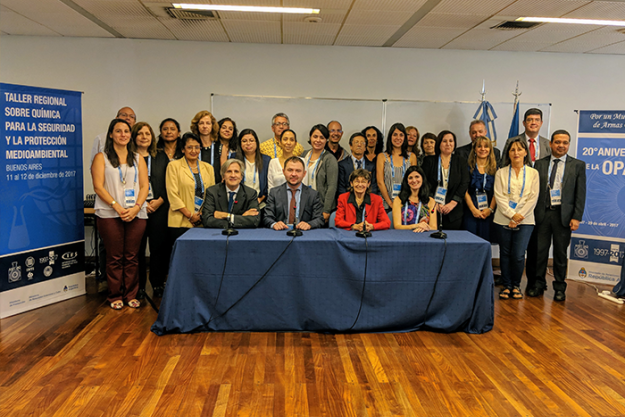
Member States from Latin America and the Caribbean (GRULAC) at a workshop on Chemistry for Safety, Security and Environmental Protection in Buenos Aires
THE HAGUE, The Netherlands — 18 January 2018 —The Organisation for the Prohibition of Chemical Weapons’ (OPCW) Member States from Latin America and the Caribbean (GRULAC) gathered for a workshop on Chemistry for Safety, Security and Environmental Protection in Buenos Aires, Argentina from 11-12 December 2017.
OPCW’s Senior International Cooperation Officer, Mr Sergey Zinoviev, noted that, “Green or sustainable chemistry is a powerful tool in achieving the culture of sustainability, starting right from the design of chemical processes and products; mindful of its prominence, the OPCW strongly supports research and education in green chemistry”. Mr Zinoviev further highlighted various capacity-building opportunities offered to scientists by the OPCW and invited the workshop participants to take part.
The Head of the National Authority of Argentina, Mr Mariano Simón Padrós, pointed out in his opening remarks that, “the advances in science and technology, and particularly in the field of chemistry, are key to the development of our countries and this is why Argentina actively promotes them”.
During the workshop, scientists and representatives of governmental institutions reported on the latest developments in scientific research, technology, design and implementation of policies in green and sustainable chemistry.
The span of topics was considerable, ranging from advanced biofuels and valorisation of waste biomass, to greener alternative products and risk assessment of chemicals. Policy issues were also tackled, mainly concerning promotion of greener policies in industry to serve development in less advanced countries.
Participants put forward a set of recommendations. One such proposal underscored the need to form scientific bodies that would issue opinions free from political and private sector considerations. Attendees also urged setting up school and university curricula on green and sustainable chemistry.
The workshop gathered 27 participants representing 12 countries: Argentina, Brazil, Colombia, Costa Rica, Cuba, Ecuador, Honduras, Paraguay, Peru, Uruguay and Venezuela. Twenty observers from local institutions were also in attendance.
The workshop – held under the auspices of the National Institute of Industrial Technology of Argentina (INTI) – was organised by the OPCW and the International Foundation for Science (IFS). The National Authority of Argentina hosted the event.
Background
The workshop was part of OPCW’s Programmes for Support of Research Projects that has been implemented since 1998 to promote the peaceful applications of chemistry under Article XI of the Chemical Weapons Convention.
As a result of the OPCW-IFS cooperation, 434 research projects have received support so far, including 106 from Latin America.
As the implementing body for the Chemical Weapons Convention, the OPCW oversees the global endeavour to permanently and verifiably eliminate chemical weapons. Since the Convention’s entry into force in 1997 – and with its 192 States Parties – it is the most successful disarmament treaty eliminating an entire class of weapons of mass destruction.
Over ninety-six per cent of all chemical weapon stockpiles declared by possessor States have been destroyed under OPCW verification. For its extensive efforts in eliminating chemical weapons, the OPCW received the 2013 Nobel Prize for Peace.
